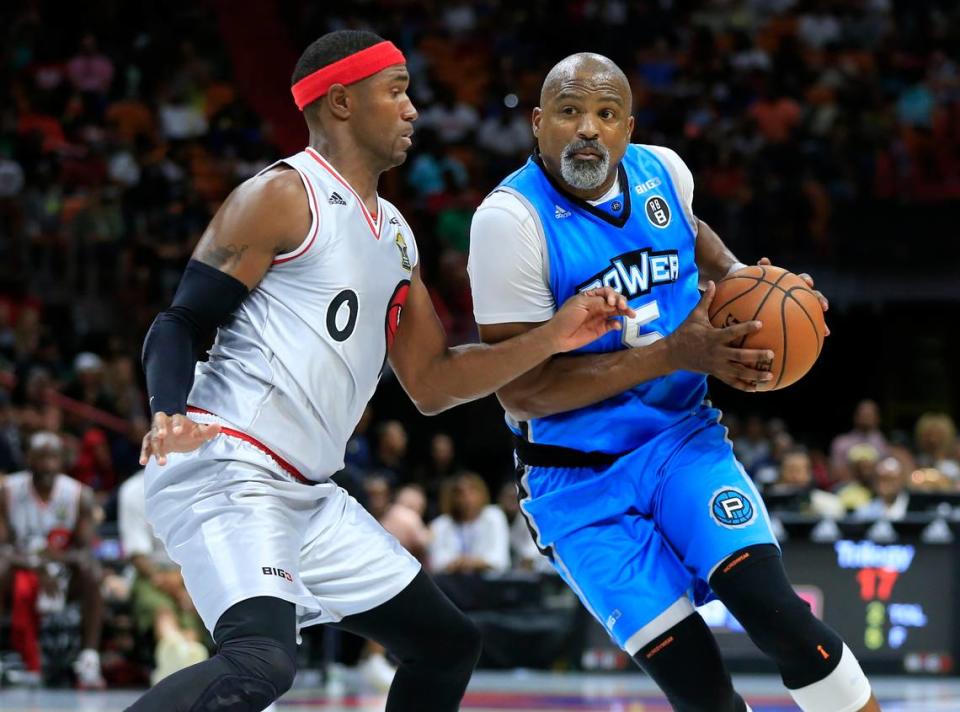Ex-NBA baller tells Black tech founders in Miami there are lessons from the game
Former NBA player Cuttino Mobley, a keynote speaker Thursday during the Black Men Talk Tech conference in Miami, used what he learned on the court to guide young entrepreneurs.
Mobley, 46, encouraged attendees to rediscover the passion that drove them to start their business, just as he did when he got a late basketball start and eventually went pro.
“Me spraining my ankle, me getting up super early, me losing the game, that’s a part of the love, right? It does that to you,” Mobley said. “And, if you fall in love with that process, and accept the feelings that come with that process, whether it’s fear, anxiety, happiness, you get farther in life.”
Mobley, former Los Angeles Clippers shooting guard and father of three, didn’t learn to play on the Philadelphia courts until he was 13. He used his struggles as fuel and by 18, he was playing with professionals. In his early 20s, he was drafted by the Houston Rockets and played alongside Scottie Pippen for a year.
Mobley’s basketball career came to an end in 2008 after a heart ailment he had worsened, the same condition linked to the deaths of former Boston Celtics forward Reggie Lewis and Loyola Marymount star Hank Gathers. Mobley was a stand-in Thursday for the original Black Tech keynote speaker Rick Ross, an entrepreneur, author and rapper who was advertised to speak at the conference but didn’t appear.

The Black Men Talk Tech Unicorn Ambition Conference, a hybrid in-person, online two-day event, is designed to provide exposure and resources to Black tech founders who are building innovative companies and aspiring to grow them. At the third annual conference, the collective has highlighted Miami and South Florida as an emerging tech hub, particularly for the Black community.
Black Men Talk Tech also works to overcome the barriers inhibiting the success of Black men in tech by creating an ecosystem that makes it feasible for them to scale their startups. Toward the end of the event, young entrepreneurs had the opportunity to pitch their startups to a panel of business leaders.
“We’re focused on these guys who are starting their own businesses, right,” said Boris Moyston, a co-founder of the conference. “They left their full-time jobs, or they’re working two jobs, and they’re saving, because they’re planning to start a company, and they’re working on the blueprint.”
Fewer than 1% of startup founders who receive venture funding are Black, according to a Los Angeles Times story. With few Black investors sitting on their boards, the percentage of Black employees at major tech companies is low, 8% at Facebook, 4.5% at Microsoft and 6% at Twitter.
A big problem within tech, Moyston said, is that early stage startup founders lean into their predominantly white social circles for hiring and promotion.
“When they saw the qualified person of color, it was like, ‘They probably could do the job real well but, I don’t think they really fit here,’” Moyston said. “That’s generally the conversation that we hear, particularly in the tech industry.”
As South Florida becomes an increasing tech hub for Black business owners, Mobley encouraged attendees to pursue their business goals, despite the setbacks.
“Be OK with failure, be OK with being scared, be OK with anxiety, be OK with these things,” he said. “Their normal feelings, right? No one successful has never not felt those things.”

 Yahoo Movies
Yahoo Movies 